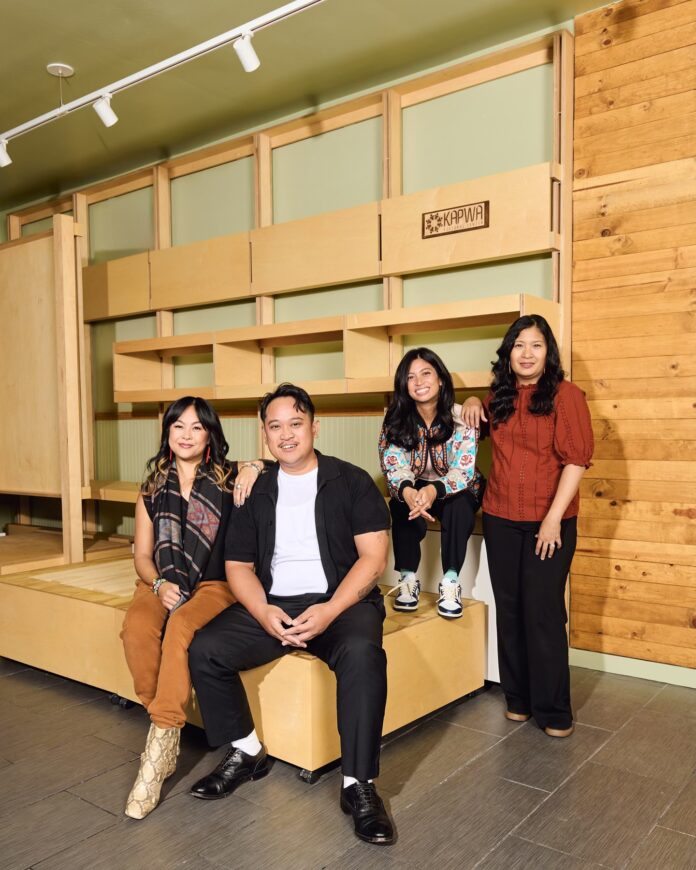What began as a dream for a creative space where Filipino Americans could find belonging has blossomed into a vibrant reality. Growing up as a young Pinay in Daly City, Stephanie Garma Balon, co-founder and senior director of the Kapwa Kultural Center (KKC), often felt out of place. She envisioned a youth-run café filled with poetry, art and music—a way to build community and honor those who came before her.
She shared this vision with her brother, Dr. Dan Balon, a dedicated activist for social justice, particularly in AANHPI leadership. His passing in 2013 inspired her to continue his legacy, turning their shared dream into KKC.
As the first of its kind in the county, KKC aims to address health inequities faced by underserved communities in Daly City, with a focus on youth and those at the intersection of BIPOC and Filipinx/a/o identities. With nearly one-third of Daly City’s population being Filipino, it is one of the largest Filipino communities outside the Philippines.
The wellness center opens in Daly City on October 25, coinciding with Larry Itliong Day and the last week of Filipino American History Month.
“The vision of this venture lies on the shoulders of those who came before us,” Balon shared with AsAmNews. “The idea of a center or a space to come together in community and kapwa is nothing new. We were inspired by our ancestors of generations past; those who laid the foundation of this ever changing evolution of work to continue the healing of our structurally undervalued communities subjected to the harm of colonialism and other systems of oppression.”
Balon credited trailblazers like Alice Bulos, Dr. Dawn Mabalon and Dr. Jei Africa for inspiring her to co-create KKC. Initially backed by the Filipino Mental Health Initiative of San Mateo County Health, the center later secured a $2.6 million grant from the Mental Health Services Act-Innovation Funding to be established by 2026 and is fiscally sponsored by Daly City Partnership.
The center will serve as a hub for youth programming, wellness and art workshops and community events, providing a space for healing through various activities. This includes learning about mental health resources and engaging in collective care activities like open mic sessions.
Balon added that the center also offers a range of expressive arts therapy programs, including herbalism and plant medicine workshops as well as craft-making sessions using recycled materials to create Filipina/x/o-inspired jewelry.
“KKC is intended to break the cycles of mental health stigma; to be a natural entry way to access culturally affirming community healing spaces where they feel a sense of belonging and safety. We hope that the center fosters a sense of acceptance of their whole personhood within themselves and amongst their peers—for them to know that they are seen, enough and supported,” Balon told AsAmNews.
Alaina Moguel, community engagement manager for KKC, highlighted the project’s mission to provide equitable resources within the community. She emphasized their outreach to residents to raise awareness of available services, recognizing the importance of culturally responsive mental health and holistic wellness offerings.
Moguel emphasized their goal of creating a more open and supportive environment by reshaping perceptions of mental health, with KKC’s foundation serving as a model for other communities to foster transformative change.
“As Filipina/x/o leaders, witnessing the growth of individuals and the community through these opportunities is incredibly rewarding,” Moguel told AsAmNews. “KKC is a continuous journey of learning and growing together, as we shape a healthier, more vibrant community where everyone can thrive.”
Balon echoed this sentiment, emphasizing the significance of their work during Filipino American History Month. “To know that we are the ‘firsts’ to lead this type of endeavor of a social enterprise is humbling and ignites a sense of pride,” Balon told AsAmNews. “This whole process, I feel has been ancestor led—and when I refer to ancestors I not only mean those who have transitioned but those living, and specifically our future ancestors.”
She mentioned her son, Makoa, and future generations who won’t have to look far to find a sense of belonging and pride in their culture.
For communities looking to establish their own wellness and cultural spaces, Balon emphasized the need to engage the community continuously to understand its needs. She encouraged them to think big and pursue a shared vision collaboratively while also prioritizing transparency and accountability.
“Dream big—the visions to materialize are possible when it’s intentionally pursued collectively,” Balon told AsAmNews. “Reimagine the world you want to live in and the legacy you hope to pass on to our future generations. And trust in the abundance of creative collective consciousness—none of this work was done by one person alone.”
AsAmNews is published by the non-profit, Asian American Media Inc.
We value your feedback. Please fill out our two-minute survey by October 25.
Join us for a stimulating conference about issues that divide the Asian American communities. Our fundraiser Common Ground and the dinner after will be held October 26 at UC Berkeley.
Then purchase your tickets to Up Close with Connie Chung, America’s first Asian American to anchor a nightly network newscast. The in-depth conversation with Connie will be held November 14 at 7:30 at Columbia University’s Milbank Chapel in the Teacher’s College. All proceeds benefit AsAmNews.
Suggested photo: https://drive.google.com/file/d/17Ddx9DFEHKMxT__nFo8fDjHCfh8kUOse/view?usp=sharing (KKC Space, photo by Bryan Garcia)
Suggested slug: filipino-pinay-BIPOC-asian-culture-heritage-sf-wellness-space-preservation-history-community

